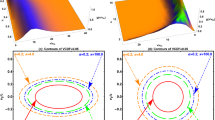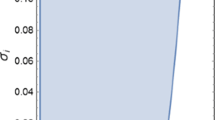Abstract
In space plasmas, particle distributions are often observed having high energy tails and are well fitted by kappa distribution function. However, in auroral region electrons are expected to be accelerated mainly along the magnetic field lines and one may expect Maxwellian behaviour in perpendicular direction. Therefore, in the present study propagation characteristics of electromagnetic electron cyclotron (EMEC) waves is studied by employing kappa-Maxwellian distribution function for energetic trapped electrons in auroral region. Real frequency and the growth rate expressions have been solved numerically for kappa-Maxwellian plasma and then analyzed by considering the effect of different plasma parameters for wide range of auroral altitudes. The numerical results obtained show that growth rate increases with the increase in ratio \({\omega_{pe}} / {\varOmega_{e}}\), plasma beta, temperature anisotropy \({T_{\bot}} / {T_{\parallel}}\) and trapped electron drift speed but decreases when superthermal electron population increases.







Similar content being viewed by others
References
Alinejad, H.: Astrophys. Space Sci. 325, 209 (2010)
Alinejad, H.: Astrophys. Space Sci. 334, 325 (2011)
Alinejad, H.: Astrophys. Space Sci. 337, 637 (2012)
Aziz, T., Masood, W., Qureshi, M.N.S., Shah, H.A., Yoon, P.H.: Phys. Plasmas 23, 062307 (2016)
Baumjohann, W., Treumann, R.A.: Basic Plasma Space Physics. Imperial College Press, London (1996)
Cattaert, T., Hellberg, M.A., Mace, R.L.: Phys. Plasmas 14, 082111 (2007)
Chiu, T.Y., Schuiz, M.: J. Geophys. Res. 83, 629 (1978)
Christon, S.P., Williams, D.J., Mitchell, D.G., Huang, C.Y., Frank, L.A.: J. Geophys. Res. 96, 1 (1991)
Collier, M.R.: J. Geophys. Res. 20, 1531 (1993)
Fennell, J.F., Gomey, D.J., Mizera, P.F.: In: Akasofu, S.I., Kan, J.R. (eds.) Physics of Auroral Arc Formation. AGU, Washington D.C. (1981)
Fried, B.D., Conte, S.D.: The Plasma Dispersion Function. Academic, New York (1961)
Hellberg, M.A., Mace, R.L.: Phys. Plasmas 9, 1495 (2002)
Kan, J.R., Lee, L.C., Akasofu, S.I.: J. Geophys. Res. 84, 4305 (1979)
Kourakis, I., Shukla, P.K.: Phys. Plasmas 12, 082303 (2005)
Lazar, M., Poedts, S., Michno, M.J.: Astron. Astrophys. 554, A64 (2013)
Lazar, M., Poedts, S., Schlickeiser, R.: J. Geophys. Res. 119, 9395 (2014)
Lazar, M., Pierrard, V., Shaaban, S.M., Fichtner, H., Poedts, S.: Astron. Astrophys. 602, A44 (2017)
Lazar, M., Shaaban, S.M., Fichtner, H., Poedts, S.: Phys. Plasmas 25, 022902 (2018)
Leubner, M.P.: J. Geophys. Res. 87, 6335 (1982)
Mace, R.L.: J. Geophys. Res. 103, 14643 (1998)
Mace, R.L., Hellberg, M.A.: Phys. Plasmas 2, 2098 (1995)
Mace, R.L., Hellberg, M.A.: Phys. Plasmas 16, 072113 (2009)
Mace, R.L., Sydora, R.D.: J. Geophys. Res. 115, A07206 (2010)
Masood, W., Muzzamal, I.S., Mirza, A.M.: Astrophys. Space Sci. 352, 621 (2014)
Parks, G.K., Lee, E., Teste, A., Wilber, M., Lin, N., Canu, P., Dandouras, I., Reme, H., Fu, S.Y., Goldstein, M.L.: Phys. Plasmas 15, 080702 (2007)
Qureshi, M.N.S., Shah, H.A., Murtaza, G., Schwartz, S.J., Mahmood, F.: Phys. Plasmas 11, 3819 (2004)
Qureshi, M.N.S., Nasir, W., Masood, W., Yoon, P.H., Shah, H.A., Schwartz, S.J.: J. Geophys. Res. 119, 10059 (2014)
Shah, H.A., Masood, W., Asim, M.T., Qureshi, M.N.S.: Astrophys. Space Sci. 350, 615 (2014)
Shukla, P.K., Yu, M.Y., Spatscheck, K.H.: Phys. Fluids 18, 265 (1975)
Stenzel, R.L.: J. Geophys. Res. 104, 14379 (1999)
Sugiyama, H., Singh, S., Omura, Y., Shoji, M., Nunn, D., Summers, D.: J. Geophys. Res. 120, 8426 (2015)
Summers, D., Thorne, R.M.: Phys. Fluids B 3, 1835 (1991)
Vasyliunas, V.M.: J. Geophys. Res. 73, 7519 (1968)
Wu, C.S., Lee, L.C.: Astrophys. J. 230, 621 (1979)
Wu, C.S., Yoon, P.H., Freund, H.P.: Geophys. Res. Lett. 16, 1461 (1989)
Author information
Authors and Affiliations
Corresponding author
Rights and permissions
About this article
Cite this article
Nazeer, M., Qureshi, M.N.S. & Shen, C. EMEC instability based on kappa-Maxwellian distributed trapped electrons in auroral plasma. Astrophys Space Sci 363, 160 (2018). https://doi.org/10.1007/s10509-018-3383-1
Received:
Accepted:
Published:
DOI: https://doi.org/10.1007/s10509-018-3383-1




